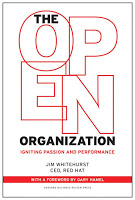Book Review: The Open Organization
Published on 2016-02-22 by Stuart SpenceThe Open Organization by Jim Whitehurst describes the open source software company Red Hat. It does a great job introducing Red Hat's unusual culture, but it was also written by the CEO so the stories and ideas are mind-numbingly positive. If you can get past its repetitious optimism then it's an interesting and worthwhile read about technology companies.

Who should read this book?
Anyone interested in trust, motivation, culture, communication, and hiring strategies at technology companies, especially Red Hat. No technical background is needed to enjoy this book.
The Good
The most enjoyable and interesting parts of the book were its stories. There's stories on how the author got hired as CEO, how Red Hat hires regular employees, and how Red Hat employees were skeptical of their new CEO and "tested" him. However, Jim Whitehurst is not an expert storyteller. Nevertheless as readers we must take what we can get, as there aren't very many billion dollar software company CEOs willing to write (somewhat) openly about their organization. The stories have a unique enough perspective that they are very worthwhile.
Good points were made on how clothes can reinforce hierarchy or shut down open communication. This can be good or bad, depending on your perspective. Including the "Peter Principle" was a nice touch, as well as other business or software concepts. Finally, there's a handful of shout outs to millenials, and what it means that they typically demand more open participation from the companies they work for.
The Bad
The CEO has written a very low risk book, mostly with the goal of promoting his company. There's nothing wrong with that of course - but a book must stand on its own, and it clearly suffers because of the author's priorities.
Where are stories from employees at Red Hat, or ex-employees? Readers aren't given any serious criticisms of Red Hat or the open organization at all. What do traditional business executives think of Red Hat's structure? Do they have intelligent reasons to turn away from it? If the book were serious about open organizations, these perspectives are critical. Instead of being about open organizations, the book is about Red Hat's positive experiences with open organizations. This is a related topic (a subset), but it's just not the whole story.
I also got the distinct impression that the CEO didn't tell as many stories or tell them in as much detail because of business interests. He writes of their "biggest competitor" but leaves them nameless. This seems petty to me. Was it Microsoft, or maybe Salesforce..? Would it really be so harmful to say? Or what about their "long time strategic partner" who turned against them? Again, what's the company name? These are just the straightforward examples - there are more. But as a reader you do feel it when the stories are missing details.
Finally, the repetition. The mind-numbing repetition! Red Hat is different. We do things differently. Differently! Different. It's a meritocracy. Meritocracy. Red Hat is a meritocracy. We do things differently. Yes, please stop, we get it.
Summary
I have a feeling this optimistic storytelling book is a recruitment tool for software developers. Much of the "open organization" seems specifically built to appeal to the disillusioned - such as encouraging "heated debate". In that capacity, maybe this CEO with a computer science background has succeeded, as Red Hat is now on my radar as a future employer.
I suspect the book will not persuade traditional executives to change their ways - I think you already have to be a bit on board with the open ethos to appreciate the read. Nevertheless, if you can get past the positive bias, whitewashed stories, and repetition, then this is a good read on Red Hat's unusual and open culture. It was a nice experience reading about a successful software company that supposedly espouses many of my own values.
